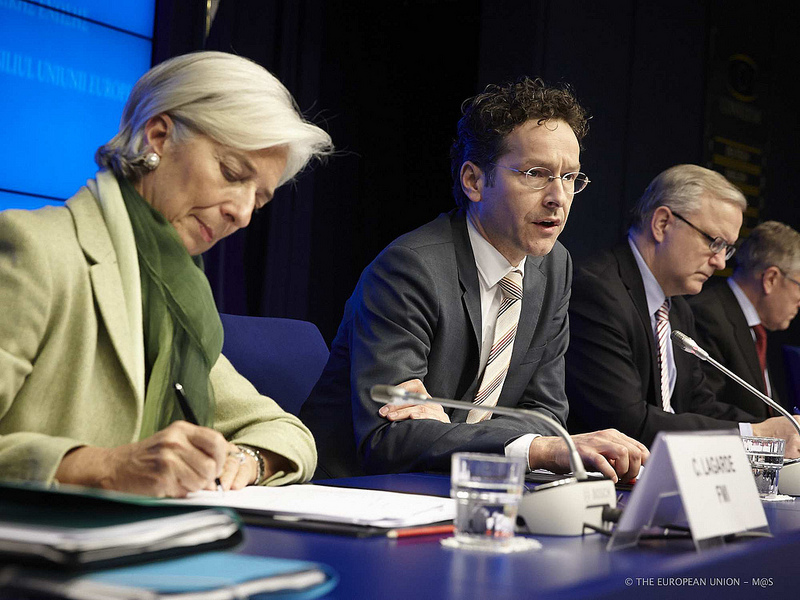
In its mission statement the Global Commission on Elections, Democracy and Security points out that while elections are vital to democracy, on their own they are not sufficient. According to, “Deepening Democracy”, a recent report, elections also need integrity. They are right. But elections are insufficient in at least another respect too. Democracy is not limited to casting a ballot once every four or five years; the nature of democratic government also manifests itself in the period between elections. This is best exemplified by the current sovereign debt crisis in the Eurozone.
Since the dawn of the Eurozone crisis in early 2010 the trade-off between austerity and democracy became obvious. Emblematic of this development is the call for a referendum on the latest European bailout by the then Greek Prime Minister Georgios A. Papandreou in November 2011. The referendum, which never took place after fierce French and German opposition, posed the question of how to reconcile austerity measures with democratic legitimacy? Recently, the Guardian even argued that the last two years “pushed Greece’s entire democracy to the brink of collapse.” One does not need to go as far as the Guardian to share the growing sentiment of many residents and political observers who see the world’s oldest democracy undermined by austerity policies.
Is there a solution the European Union’s austerity vs democracy conundrum?
A possible way forward is participatory budgeting and other measures of participatory democracy. The idea of participatory budgeting was first developed in Porto Alegre, a city in the South of Brazil with a population of more than 1.5 million. In essence, citizens are invited to contribute to the budget-writing process. In Porto Alegre the municipal government organises two rounds of assemblies in each district to collect feedback on five thematic areas ranging from transport to social welfare to taxation. Every assembly comes up with a list of priorities, which are put forward to the city’s budget council. They decide where to allocate the funding. If the council rejects one or more of the recommendations, it has to justify its decision publicly.
Admittedly, the Greek case is different. Where to spend money is not the problem; — it’s where to make cuts. Nonetheless, increasing citizen participation in the budget-writing process is a viable option. Ironically, Greece could draw upon the experience of German debt-ridden municipalities and cities. In North Rhine-Westphalia, the most populous state of Germany, nearly half of the municipalities are highly indebted. Hence, a sizeable number of local authorities successfully applied participatory budgeting to develop a strategy for reducing the public debt.
How participatory budgeting could be implemented in Greece
First of all, it needs to be as inclusive and accessible as possible. The participation opportunity should be promoted via television, newspapers and a one-stop-shop web page. As a second step, the national government should publish a list of the planned top 50 budgetary policies. Eventually, the respective regional councils should organise regional conferences in all thirteen Greek regions except those which populations exceeding 500,000 people (e.g. Attika or Central Macedonia). For these cases conferences can be held at the sub-regional level to ensure widespread participation.
The aim of the conferences is two-fold: one the one hand, citizens should prioritise and comment on the government’s list of budget policies. One the other hand, every regional conference should come up with a set of its own recommendations. After the first round of regional conferences, the outcome can be presented to the budget committee of the Greek parliament, which can then hold an initial debate on the citizens’ recommendations. In a possible second round, members of parliament could present their opinions on the recommendations to the regional conferences. The regional conferences should adopt revised lists. In the end, the parliament will vote on the budgetary policies and report back to the regional conferences.
Numerous arguments underline the potential of participatory budgeting in Greece. First of all, it makes deficit reduction more transparent and initiates a nation-wide inclusive conversation on the future of Greece. Secondly, the increased transparency reduces the power of special interests — like the too powerful Greek ship owners — and boosts public accountability. This can help stamp out corruption.
Most importantly, though, all of this would enhance the legitimacy of the tough austerity policy, quelling, one would hope, the social uproar in Greece. Indeed, it is possible that participatory budgeting would strengthen Greek democracy and help to restore the trust of the Greek people.
Marian Schreier is an MPP student at the Blavatnik School of Government at the University of Oxford.
This post is part of our Deepening Democracy series, responding to a September 2012 report by the Global Commission on Elections, Democracy and Security, on improving the integrity of elections. The series is being curated by the Blavatnik School of Government and hosted on Politics in Spires. It features contributions from students on the Master of Public Policy course at the Blavatnik School, as well as guest posts from Oxford and Cambridge scholars in politics and international relations.







3 Comments
The only problem with this is the fact that democratizing social cuts will inevitably be a numbers game. If there are more young people than old, then watch how pensions are slashed or 100% of public frail care is stripped of funds in order to pay off student debts.. for instance. Democracy has its limits.